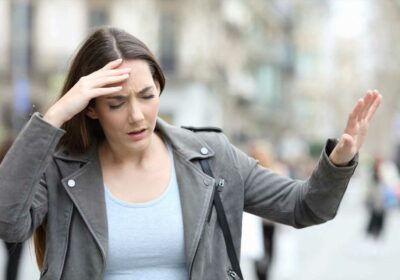The simple trick that can stop you feeling dizzy in a matter of seconds

DO you feel a rush of dizziness when you stand up?
You’re in luck, for researchers have at last found a simple trick that can combat the disorientating problem.

Dizziness upon standing is a common phenomenon that you’re likely to have experienced at least once.
A typical cause is a sudden drop in blood pressure, called orthostatic or postural hypotension.
When you shift from lying down or sitting to standing, the blood pools in your legs temporarily.
There is a delayed response to this shift in blood, and the body has to work hard to get the blood back to the heart.
It squeezes blood out the large veins in the legs and increases blood pressure and heart rate for a moment.
You could feel woozy for a couple of minutes.
For some people, if this condition is severe, the effects of standing up can have an impact on their day-to-day life.
And while it’s easy to brush the condition under the carpet, research has linked it to an increased risk of conditions such as heart disease and dementia.
Doctors tend to diagnose orthostatic hypotension if your blood pressure drops more than 20 mmHg in systolic pressure and 10 mmHg in diastolic pressure within three minutes of standing up.
Most read in Health
HIGH ALERT Warning over fatal Covid complication that strikes MONTHS after bug
The 5 simple changes that could add ten YEARS to your life
UK's new daily Covid cases plummet by 40% in a week as deaths rise to 314
The 17 ‘weight loss’ foods that are actually STOPPING you from shedding pounds
Lead author of the new study Dr Satish Raj, a cardiologist in Canada, said: "Almost everyone has probably experienced some lightheadedness at some time after standing up.
“For some people this is a frequent occurrence and may happen several times a day, which can be very frightening and negatively impact their quality of life.
“We wanted to explore this further and provide novel and effective symptom management techniques with the goal of improving the patient's quality of life."
The research, published in Heart Rhythm, studied 24 young women who were regularly burdened by fainting when they stood up.
Each participant did three experiments; one in which they stood up normally, and two after practising exercises prior to standing.
Researchers found that revving up the lower body muscles slashed the odds of symptoms on standing, proven with analysis of various blood and heart measures.
One method involved leg crossing while seated followed by actively tensing the thigh and buttocks muscles immediately after standing.
The other was repeatedly raising the knees, so the feet come off the floor, before standing.
Now, researchers believe they have found a “cost free” and “simple” tool for reducing the likelihood of dizziness on standing which can be done anywhere, and any time.
The findings, published in Heart Rhythm, now need to be validated in men and the elderly, experts said.
The NHS says see your GP about dizziness “if you’re worried”, or if:
- the dizziness will not go aFway or it keeps coming back
- you're finding it harder to hear
- there's ringing or other sounds in your ears (tinnitus)
- you have double vision, blurred vision or other changes in your eyesight
- your face, arms or legs feel numb
- you have other symptoms like fainting, headaches, feeling or being sick
Dizziness can be a sign of anaemia, clogged arteries, a brain tumour, inner ear problem or medication side effect.
Source: Read Full Article




